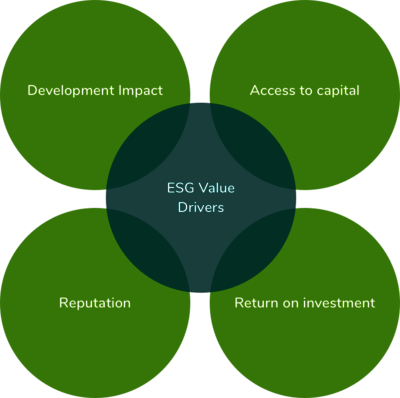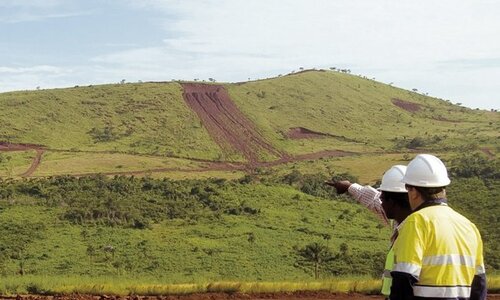ESG Standards and Development Impact
By investing in infrastructure, Africa50 aims to promote sustainable economic growth and job creation and to improve the lives of people on the continent, while preserving natural resources for future generations and creating value for shareholders. We believe that a strong Environmental, Social and Governance (ESG) proposition creates value by laying the foundation for sustainable investing, continued government and community support, and access to investment capital and world-class partners, which will better position Africa50 for long-term profitability and impact.
Our ESG Strategy and ESG Policy were approved by the Africa50 Board of Directors in 2019 and the Environmental and Social Management System (ESMS) was implemented in 2020. Dedicated ESG resources are in place to oversee the policy, the ESMS implementation, and the embedding of ESG culture throughout the organization. Africa50, will report periodically on the ESG performance and compliance of our projects.
Africa50’s commitment to ESG Policy is guided by a host of applicable internationally and nationally accepted principles, guidelines, and good practice standards. Africa50, the lead sponsors it partners with, and the underlying portfolio companies are expected to act in accordance with the following reference framework:
- Applicable national and local ESG laws and regulations;
- International Finance Corporation (IFC) Performance Standards on Environmental and Social Sustainability or (in certain cases) The African Development Bank Safeguards and Sustainability Series.

Africa50 ESG Principles
In addition to complying with the relevant international and local standards, Africa50 commits to the following set of guiding principles:
- Support a precautionary approach to environmental challenges;
- Inspire the efficient use of energy and natural resources to reduce the impact on climate change and to contribute towards the sustainable use of depleting resources, including forests and water;
- Encourage the reduction of greenhouse gas emissions in its operations and in those of its portfolio companies;
- Avoid and, if not possible, minimize adverse impact on human health and the environment.
- Support and respect the protection of internationally proclaimed human rights;
- Support and respect fair labour and working conditions;
- Protect the health and safety of workers, surrounding communities and customers;
- Adopt high standards of professional conduct and excellence;
- Exhibit honesty, integrity, fairness and respect in all its dealings; and
- Enhance the good reputation of Africa50.
Climate Change Guiding Principles
While climate change presents significant risks and adversely affects the African continent, the new investments needed over the coming decades to mitigate, adapt to and build resilience against the effects of climate change, provides our African country shareholders an opportunity to drive sustainable economic development and diversification through the creation of new economic value chains and industries. Given the enormity of the task at hand to mitigate and adapt to climate change, African countries will need to leverage greater participation of the private sector.
Africa50, in keeping with our core mandate, will seek to catalyze funding from the private sector, working together with diverse stakeholders to deploy mitigation and adaptation strategies, through amongst others, a strong focus on climate-friendly infrastructure investments and in the use of new technologies to help the continent accelerate its transition to Net-Zero.







